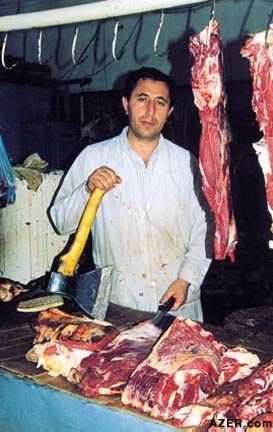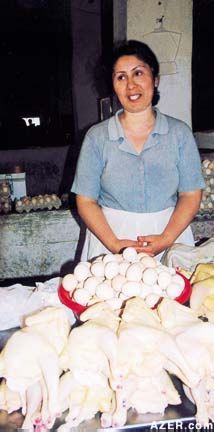|

Autumn 2000 (8.3)
You Are What You Eat
Islamic
Food Practices and Azerbaijani Identity
by
Farid Alakbarov

Above:
Caspian
fishermen catching sturgeon which is prized for its caviar as
well as its meat. Courtesy: BP
Various
world religions have dietary laws, especially in terms of meat.
A Jew may observe the elaborate and stringent kosher system,
a Catholic may choose not to eat meat on Fridays, and a Buddhist
or Hindu may adhere to a vegetarian diet. Similarly, Islam has
dietary codes that all believers are supposed to follow - in
a nutshell: no pork, no alcohol and daily fasting during the
holy month of Ramazan.
Although Azerbaijan is a very secular country, its Islamic background
is beginning to show itself in Azerbaijani eating patterns. The
trend is slight, but it is there. Surprisingly, young people
are the ones who are more likely to be exploring these issues.
Older generations seem to have no desire to embrace food practices
of the pre-Soviet period.
_____
Islam reached Azerbaijan in the 7th century, when Arabian invaders
imposed their religion on the region. In this new faith, foods
like pork, shellfish, sturgeon and caviar were forbidden, and
came to be known as "haram". Foods that were permitted
- referred to as "halal" - had to be slaughtered in
a specific way, with the animal turned toward Mecca and the name
of Allah invoked. If the animal died in another fashion, it was
also considered haram. Wine and other alcoholic beverages were
also prohibited.
  Left: The meat section of the Taza Bazaar
in Baku. Lamb is one of the most popular meats. Photo: Blair Left: The meat section of the Taza Bazaar
in Baku. Lamb is one of the most popular meats. Photo: Blair
The
relevant passage of the Koran reads:
"Forbidden to you (for food)
Are: Dead meat, blood,
The flesh of swine, and that
On which hath been invoked
The name of another than Allah;
That which hath been
Killed by strangling,
Or by a violent blow,
Or by a headlong fall,
Or being gored to death,
That which hath been (partly)
Eaten by a wild animal;
Unless ye are able
To slaughter it (in due form);
That which is sacrificed
On stone (altars);
(Forbidden) also is the division
(Of meat) by raffling
With arrows: that is impiety.
But if anyone is forced
By hunger, with no inclination
To transgress, Allah is
Indeed Oft-Forgiving,
Most Merciful."
Source: Sura 5, al-Ma'idah (Meal), Ayah 3. Holy Qur'an.
Text, translation and commentaries by Abdullah Yusif Ali. Amana
Corporation, Brentwood, Maryland, 1989, pp. 244-245 (in English).
Changing Food Patterns
Folklorist Ahmad Oghuz observes that pork may have been forbidden
even prior to the adoption of Islam. In the Orkhun-Yenisey monuments
of the 5th to 8th century, a negative reference is made about
the Chinese who are defined as "those who eat pork"
(laghzin eti yeyenler).
Such food restrictions were more or less observed throughout
Azerbaijan until the Bolsheviks took over in 1920 and the state
officially imposed atheism on the entire population of the Soviet
Union. Under Stalin's command in the late 1930s, the doors of
mosques and churches were closed. Many religious buildings were
demolished. The few that survived were usually converted into
concert halls or museums.
Since Soviet slaughterhouses did not follow Islamic codes, it
became increasingly difficult for Azerbaijanis to buy halal foods.
To keep from eating haram, some elders avoided Soviet sausages
because they were made of pork. As the decades passed, succeeding
generations hardly knew about the Islamic rules and learned to
eat Russian mainstays like cabbage, borscht and pork sausage.
Foods that had once been prohibited became standard.
In Azerbaijan today, everyone has to the freedom to practice
his or her own religion. The Azerbaijani Constitution, adopted
November 12, 1995, separates religion from the government and
there is no official state religion. Accordingly, there are no
laws about foods that are forbidden.
In this freer climate, there is a slightly noticeable swing back
toward observing Islamic food prohibitions, but not toward the
original rules. For one thing, older Azerbaijanis don't want
to follow all of these restrictions. Most of them are traditionally
Muslim but do not practice the religion much or attend mosque.
They have lived their lives without observing the Islamic codes
and don't feel the necessity to start now.
It's also important to note that different regions of Azerbaijan
vary in their degree of religiosity. Islam is traditionally stronger
in the outskirts of Baku and among the native residents of Baku's
Ichari Shahar (Inner City). Islam also has more of a hold in
towns and villages in the Lankaran-Talish area near the Iranian
border, including districts like Masalli, Astara, Lerik and Lankaran
and in some regions of Nakhchivan. On the other hand, Islam is
weaker in the central areas of Azerbaijan, especially in those
villages situated between the Kur and Araz rivers.

Above:
Available
in Azerbaijani markets-both pork sausages (left) and "halal"
chicken sausages. Photo: Sadikhova
Making Exceptions
If an Azerbaijani does want to observe food restrictions, he
or she can buy halal meat at special Muslim food shops. Regular
stores also sell a few halal products like American Halal Chicken
Sausage, which is produced especially for Muslim countries. However,
most Azerbaijanis don't buy halal foods. They just buy ordinary
meat from the butcher.
To placate customers, some Azerbaijani restaurants call pork
(donuz) by a different, less offensive name: "wild boar"
(gaban). There is no deception here; everyone knows that the
meat is really just pork.
Although Islam forbids alcohol at all times and in all circumstances,
most Azerbaijanis do not observe this ban. Some do, however,
refrain from drinking during Orujlug (the Muslim fast) and Ashura
(the religious mourning period of the Shiites).
During the month of Ramazan, Muslims are not supposed to eat
or drink anything - not even water - from sunrise to sunset.
In Iran, this rule is closely observed - at least in public;
those who choose to eat or drink during the day tend to do it
in the privacy of their own homes. In Azerbaijan, however, only
a few people observe the fast. Most restaurants are open throughout
Ramazan, although a few refrain from selling alcohol during this
period - especially Turkish restaurants.
  Trends Among Youth Trends Among Youth
Curiously, if there is any attraction to halal, the tendency
seems to be among younger people, who are more likely to follow
these practices than their parents are. Most Azerbaijani youth
do not practice religion, though most consider themselves to
be Muslim. However, there is a certain curiosity among the youth
to explore the Islamic way of life. Some avoid pork, but still
drink alcohol. Azerbaijani women in general don't drink alcohol
anyway, although Russian women are known for it.
Left: Eggs and free-range
chickens from the regions tend to be preferred above imported
meat products. At the Taza Bazaar in Baku. Photo: Blair
One Azerbaijani scholar notes that it would be rare for a doctor
or professor from the Academy of Sciences to go to the mosque
regularly and follow the Muslim food restrictions. However, he
notices that some of the Academy's youngest scholars do pray
several times a day, abstain from drinking alcohol and refrain
from eating pork.
In general, this younger generation didn't learn about haram
and halal rules from their elders, but from foreigners. Some
studied at Turkish schools or universities; others came into
contact with Arabic and Iranian visitors to Azerbaijan. The religious
influence from Turkey seems to be considerable, much greater
than from Iran.
Of the young Azerbaijanis who observe aspects of the Islamic
way of life, many may be doing it as part of their search for
identity. In this time of transition, they now have the freedom
to explore who they are as they learn about various religions,
including Christianity. Many of them are also interested in astrology
and just like their Western counterparts are quite amused by
reading daily horoscopes and learning about the signs of the
Zodiac.
Are Islamic food codes just a passing fad? Or is this a sign
that young Azerbaijanis are trying to reclaim the past by moving
toward the religion of their ancestors? These questions - ones
that only time can answer - strike at the heart of a much larger
issue in everyone's minds: in this post-Soviet reality, what
does it mean to be Azerbaijani?
Aynur Hajiyeva
and Farida Sadikhova also contributed to this article.
_____
From Azerbaijan
International
(8.3) Autumn 2000.
© Azerbaijan International 2000. All rights reserved.
|